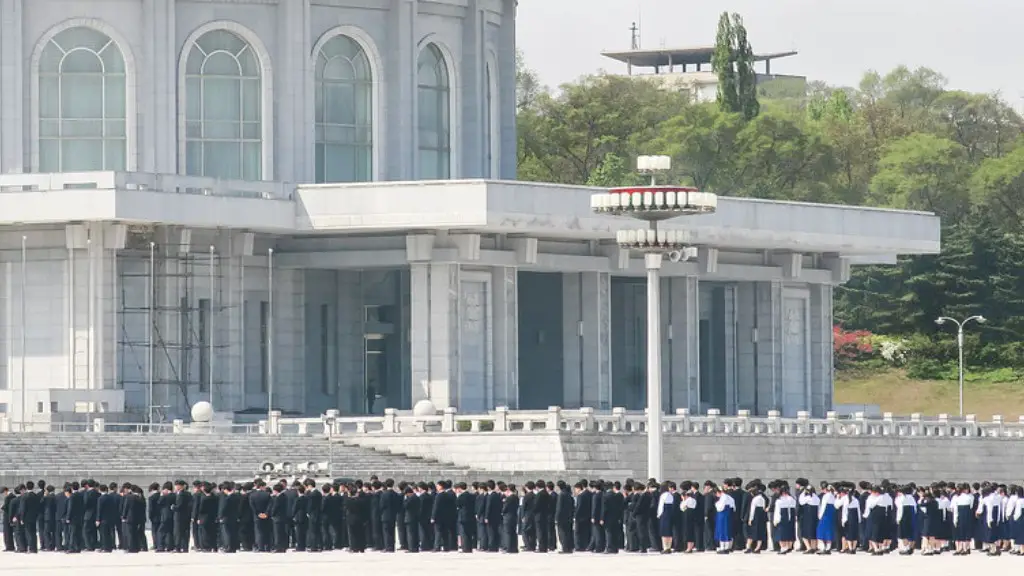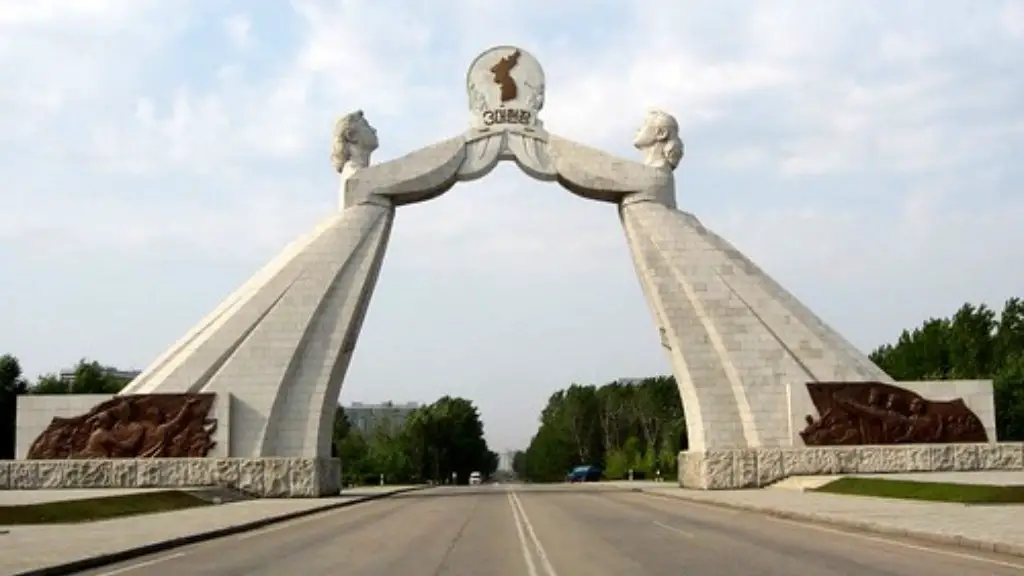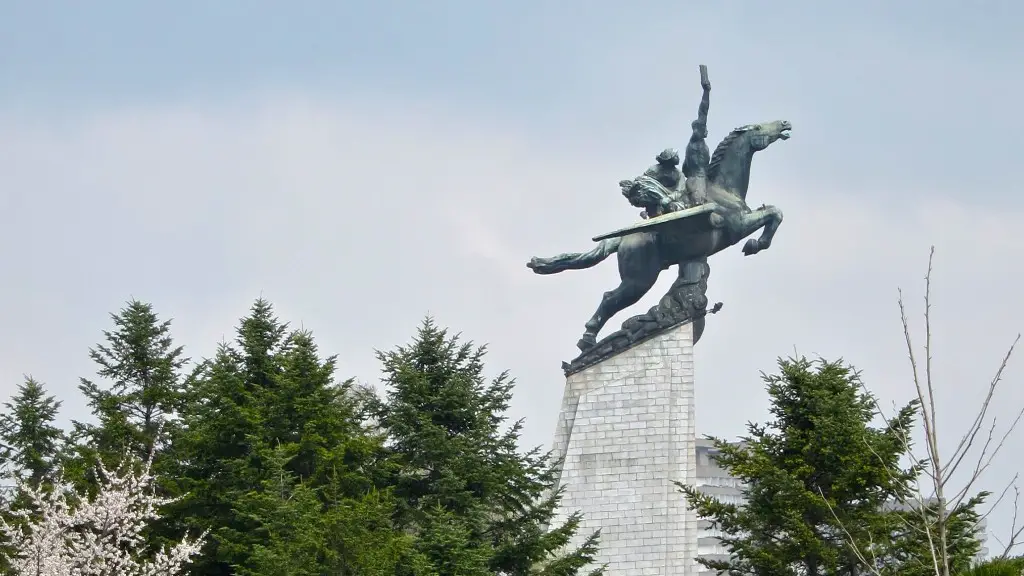The intense animosity between North Korea and South Korea runs deep and is hard to reconcile. Since 1948, the two sides have been at each other’s throats in a conflict that has rarely abated and threatens to erupt into a full-on war. Ever since the establishment of two different governments on the Korean peninsula in 1948, North Korea and South Korea have been embroiled in a never-ending tug-of-war. From the outset, both nations shared a common ancestry, language, and culture. Yet their political ideologies are diametrically opposed. North Korea is a communist-based, totalitarian state, while South Korea is a democratic, capitalist nation. The ensuing conflict has been entrenched in mistrust, misunderstanding, and violence.
To truly understand the origins of the animosity between the two countries, it is important to examine the contentious history between them. The Korean War (1950-1953) is still seen as the key event that led to a deep sense of animosity between North and South Korea. After decades of oppressive Japanese rule, the Korean conflict represented the transformation of the peninsula from a free, unified nation, to a divided and war-torn state. Each side has been ascribed blame for the war, and it remains a contentious issue for both sides.
However, there is more to the conflict than just the war. In a word, politics. North Korea has long been considered a nuclear threat by the world’s major powers, while South Korea has forged closer economic and diplomatic ties with the rest of the world. This has led to further mistrust between the two sides, as North Korea rebels against the modern world and clings to its outdated political system. In addition, the two states have taken extremely divergent paths in terms of economic development. North Korea has embraced a rigid, state-controlled system, while South Korea has achieved remarkable economic growth over the past decades through democratic reforms and economic liberalization. This kind of stark contrast has also served to increase the hostility between the two sides.
The animosity between North Korea and South Korea is palpable, and some experts have even argued that it has reached a point where the two sides can no longer hope for reconciliation. Others, however, believe that reconciliation is still possible, but only if both sides are willing to accept one another. This is no easy feat, as deep-seated mistrust remains a roadblock to any lasting peace. At best, the two sides can strive for détente, or a compromise wherein both sides can coexist peacefully.
However, the future of reconciliation between the two sides remains uncertain, with no end to the conflict in sight. North Korea continues to caution against any attempts to reach out to South Korea, and both sides have thus far addressed the other with hostility. The reasons for the animosity between North and South Korea are complex, but ultimately it boils down to conflicting political ideologies and the mistrust it has caused. Lasting peace for the Korean peninsula remains, for now, a distant dream.
Military Capability
Another issue that has fanned the flames of animosity between North and South Korea is the issue of military capability. North Korea has a well-developed military, with an estimated 2.2 million personnel, and is currently believed to possess an active arsenal of nuclear weapons. On the other hand, South Korea has a much smaller military and is limited in what it can do to confront its northern neighbor due to its status as a U.S. ally. Moreover, South Korea is constitutionally barred from possessing nuclear weapons and thus faces a significant military disadvantage in any potential confrontation with North Korea.
Meanwhile, North Korea’s military is constantly on alert, ready to spring into action should South Korea or its allies make any kind of offensive move. This has been compounded by North Korea’s efforts to strengthen its military in recent years, including developing a potential intercontinental ballistic missile and conducting numerous nuclear tests. This display of military might has only further entrenched the animosity between the two sides and has raised fears of a possible war in the region.
However, some experts have argued that North Korea’s military build-up is primarily a defensive measure meant to deter any kind of aggression from South Korea and its allies. North Korea has also stated that it does not seek to engage in any kind of open conflict, and is willing to negotiate a peaceful resolution to the conflict. The effectiveness of this stance remains to be seen, as recent tensions between the two sides have yet to abate.
Reunification Efforts
Various initiatives have been made over the years to try to bring the two sides closer together and push for a more peaceful future. These have included the Sunshine Policy of South Korea’s former president Kim Dae-jung and the Kaesong Industrial Complex, where North and South Korean workers cooperate in a joint venture.
However, these efforts have been hampered by continued tensions between the two sides, with North Korea often making provocative moves that serve to heighten distrust. In addition, the South Korean government’s attempts to reach out to North Korea have often been met with suspicion and hostility. As a result, the two sides remain firmly entrenched in animosity, with little hope of improving relations in the near future.
The Korean reunification movement, while well-intentioned, has also been hampered by significant internal divisions. In particular, younger generations of South Koreans are increasingly skeptical of reunification, with many viewing the prospect of a unified Korea as too costly and too risky. This contrasted sharply with the views of their elders, many of whom viewed reunification as a sacred mission that would rejuvenate the Korean nation.
International Relations
The animosity between North and South Korea is also shaped by the nations’ divergent international relations. North Korea’s relations with the international community remain poor, with the country perceived as a nuclear threat by many of the world’s major powers. Meanwhile, South Korea enjoys strong economic and diplomatic ties with the rest of the world, and its close alliance with the United States has only further strained relations between the two sides. This has created an environment of mutual distrust and has served to further deepen the animosity between them.
The international community has also been at odds on how to deal with the situation in the Korean peninsula. Many countries have called for tougher sanctions on North Korea, while others have advocated for a softer approach that would focus on dialogue and negotiations. As a result, the situation remains in a state of flux, and there is no clear resolution in sight.
For the time being, it seems that the animosity between North and South Korea will remain, with both sides seemingly unwilling to budge from their hardline stances. Reconciliation will remain a distant dream until both sides can move beyond their historical animosity and embrace a path of peaceful coexistence.
Conclusion
The animosity between North Korea and South Korea is firmly entrenched, with the two sides seemingly unable to reconcile their differences. The conflict can be traced back to their divergent political ideologies, a turbulent history, and a standoff over military capabilities. Furthermore, the two countries have taken vastly different paths in terms of economic development, with North Korea choosing a state-controlled system while South Korea pursues economic liberalization and democratic reforms. This stark contrast has also served to exacerbate the hostility between them.
The international community has, through various initiatives, attempted to bridge the divide between the two sides, but these efforts have so far been met with resistance. Lasting peace and reconciliation between the two sides remains a distant dream, with the conflict showing no signs of abating anytime soon. The future of the Korean peninsula thus remains uncertain, with both sides continuing to view each other with mistrust and suspicion.




